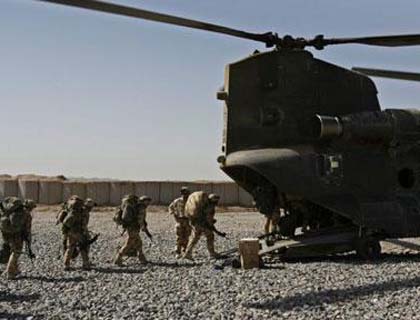The assassination of Professor Burhanuddin Rabbani in a high security area of the Afghan capital raised many question about the ineffective security measures of NATO and the Afghan government for protecting civilian life in Afghanistan. This is a shameful failure that a known politician is brutally killed in day light in a country where the headquarters of all NATO member states exist with all types of modern technologies, weapons and well organized civil and military intelligence infrastructure. The assassination once again put Pakistan's relations with Afghanistan on strain. Afghan government accuses Islamabad for its links with the killers.
Interior Minister, Bismillah Khan Muhammadi, intelligence chief, President Karzai, Robert Gates and Obama on their turn, accused ISI for the assassination. Pakistan categorically rejected all false accusations against the ISI involvement in Rabbani murder. Five years ago, when Prof Sabghatullah Mujaddidi was attacked by terrorists on his way to office, he also put his pack of accusation on Pakistan's shoulders.
After two weeks consecutively blame game, threats and anger, contradictory statements of the Afghan and US governments, and the diverse reactions of Pakistan and Russia, President Obama and his administration finally realized that without the military and political cooperation of Pakistan, the military mission in Afghanistan cannot be accomplished. Obama said he would not send US troops inside Waziristan in pursuit of the Haqqani Taliban Network.
As we all know Afghan administration has badly failed in key security areas and internal power politics within the country has isolated all important issues. In western capitals, the climate of fear is sharply prevailing regarding Afghanistan future civil war as the deadline of NATO withdrawal approaches.
Last week, Russian envoy to NATO said if the mission in Afghanistan has failed, international community should withdraw its forces from the country. As the UN Security Council mandate has already expired, Mr. Rogozin said Russia will not agree to US military presence in Afghanistan.
Afghanistan's security problems are very complicated. Factionalism, corruption, sectarianism, ethnicity, poverty, national alienation, the presence of foreign forces and many other misadventures present a frightening picture of insecurity in the country.
The development of corrupt culture within the security forces and the inclusion of criminal warlord's private militias into the military ranks and files further increased in the disparity of international community that if situation remains the same, what will happen after the NATO withdrawal from the country in 2014.
Former American commander in Afghanistan, General McChrystal has rightly said that U.S and NATO have never been serious about the complexity of the Afghan conflict. General McChrystal wanted to build the Afghan police to a force of 160,000 by 2013 but his dream remained incomplete.
The General admitted that his country had a very weak assessment of the seriousness of situation in Afghanistan. This unrealistic approach of the US and NATO allies to the war in Afghanistan provided some states with opportunities to destabilize the country through their proxies. Former British Ambassador to Afghanistan, Mr. Sherard Cowper Coles recently revealed about the failed ISAF efforts in Afghanistan.
According to the Washington Post report (4 Sep 2011), from January to June, more than 24,000 Afghan soldiers have left their jobs. In June 5,000 soldiers deserted or joined the Taliban militias. Defection is increasing while hundreds of soldiers are fleeing their battalions every month because they have no idea about the consequences of this unpopular war. Afghan Defence Minister Abdul Rahim Wardak expressed deep concern and said this would be a problem as Afghan army is taking control of security in various provinces.
He admits many drug cases recently discovered within the Afghan army. Opium and hashish are their favourite food. Some Afghan military officers and soldiers were recently removed from service for their involvement in drugs offences. Some officers are running their own businesses to support their families. Every month, one-fifth soldiers of the Afghan army become absent without informing their commanders.
The inclusion of war criminals in army units created many controversies. The involvement of these militias in human rights abuses and the deep ethnic imbalance in the ANA means this army represent war criminals instead the state of Afghanistan. Sectarian, tribal and political background of officers and soldiers is a serious challenge for NATO allies who want to build a strong Afghan army.
Recruitment on ethnic and sectarian basis has created many problems. Generals from both Sunni and Shia groups are trying to arm their groups respectively. The power of the warlords, their private military networks and their private security firms present the biggest challenge to the country's rehabilitation as a functioning state. War criminals are trying to maintain their criminal militias and keep the state weak.
There are debates in various forums that whether Afghan National Army would be able to extend the writ of the government to the whole of Afghan territory? Will ANA be able to defeat the Taliban or not? The answer is no. Security situation in Afghanistan is deteriorating day by day.
According to the ICRC recent report, Afghanistan has been going through a serious threat of increasing insecurity. The recent attacks in Kabul signal the approaching of unending civil war as Afghan journalist Delawar Sherzai has rightly understands that the fate of Afghan war is still vague as its destiny is completely vague.
The agony of Afghanistan did not end with the US and NATO military involvement. A new phase of civil war can any time begin among various ethnic and sectarian groups which has no less destructive the Mujahedeen and Taliban rule.
In the words of prominent scholar Dr. Rasool Bakhsh Rais: "The war has accumulated all the elements of a deadly mix—ethnicity, sectarianism, religious extremism and external intervention". Military experts say that if the seeds of factionalism, sectarianism and regionalism take root in the Afghan army, another future civil war cannot be ruled out in Afghanistan.

